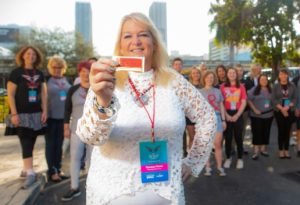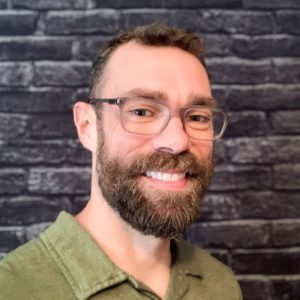Professional Development
Upcoming educational programs
You may also want to view the chapter pages for additional in-person and educational sessions.
“Crisis Leadership in Polarized Environments”
Casey Boggs, President, ReputationUS
Thursday, Jan. 29 at 11 a.m. ET
Reputation is everything. And there are constant risks to reputations in today’s environment. Billionaire Warren Buffet famously stated, “It takes 20 years to build a reputation and five minutes to ruin it. If you think about that, you’ll do things differently.”
Listen in as Casey Boggs, President of ReputationUS, provides insight into the most prominent reputational risks and impact to address in the coming year. He’ll share how your organization can cope with and overcome polarized environments, crisis situations and challenging audiences.

Casey Boggs is a global communications leader and Cornell University–certified expert in public relations, public affairs, reputation management, and crisis mitigation. He serves as president of ReputationUs (RepUs), an international public relations and reputation management firm specializing in protecting and strengthening the public image of for-profit organizations, nonprofits, and civic entities, including police agencies, fire departments, and school districts.
Before founding RepUs, Casey served as President of LT Public Relations, where he led strategic communications initiatives for organizations across financial services, law enforcement, healthcare, and legal sectors. Earlier in his career, he was Director of Public Relations at AIG, guiding communications before and during the global financial crisis. He also held senior agency roles managing national and global accounts at two of the world’s largest public relations firms, Waggener Edstrom and Weber Shandwick.
Click here to register.
Beyond the Pitch: A Real Conversation About Journalists and PR
A Collaboration of RCC and RNA (Religion News Association)
Feb 24 webinar
Religion journalists and religion communication professionals play distinct roles, but share a common interest in helping the public better understand religion as it is lived, practiced, and experienced in communities around the world. This webinar brings experienced journalists and PR professionals together to explore how thoughtful, well-defined relationships can support stronger reporting, clearer communication, and more informed audiences.
The conversation will focus on practical insights drawn from real experience, including how outreach can be most effective, how trust and credibility develop over time, and how both sides navigate professional ethics and editorial independence in today’s media environment.
Registration info to come.
Narratives of Belonging in a Divided Age
Allison Ralph, PhD, Founder & Principal, Cohesion Strategy
March 23 at 2 p.m. ET webinar

Allison Ralph reflects on the stories we tell about who belongs in society, and how those narratives can either entrench division or support pluralism. Drawing from her work on identity, social cohesion, and democratic norms, she offers a powerful framework for rethinking the values and language that hold communities together.
A thought leader in religious pluralism and social cohesion, Dr. Ralph brings 20 years’ experience in strategy, research, and nonprofit and philanthropic leadership. She previously worked at The Aspen Institute, where she served as Associate Director of the Religion & Society Program and Director of its Religion and Philanthropy Initiative. Allison has a PhD in church history from The Catholic University of America, and an MPhil from Cambridge University. Her graduate research focused on how societies manage or fail to manage their internal diversity, and how they create and maintain social boundaries.
According to Cohesion Strategy, “We help communities and organizations progress through conflict and tensions productively, building connection and shared purpose. We design strategies, facilitate dialogue, and lead research that help people work across divides — building social cohesion through collaboration, not consensus.”
For more: Cohesion Strategy | consulting on pluralism and belonging
Past Professional Development Webinars
Past Recorded Webinars and Convention Presentations
Shared below are our most recent educational development webinars; click here to go to our YouTube channel, with videos of past webinars, convention presentations and Wilbur awards
Perspectives of Traditional Religions on Positive AI Futures
William Jones, Associate for Futures Program, Future of Life Institute

Dec 10 webinar
“The Epidemic of Human Trafficking”
Theresa Flores, Advocate, Author and Survivor
November 20 webinar
 Did you know:
Did you know:
– Social media is the #1 way people are groomed into being trafficked.
– Sextortion is the #1 threat to teens today; it is how many traffickers force or blackmail them into being trafficked.
– In the United States along, an estimated 24,000 individuals are victims of human trafficking; 54% of those trapped in modern slavery are women and girls.
– Human trafficking is one of the fastest growing crimes ever. (Statistics courtesy of Operation Underground Railroad and Theresa Flores).
During her presentation, Ms. Flores provided insight into and statistics regarding sexual trafficking, sharing her thoughts as to what must be done in order to combat this epidemic. According to her, “We desparately need more sheepdogs to protect the sheep, our youth. We must work to stop the demand and to limit the customer and find better ways to protect and help our youth.”
Click here for the video.
Podcasting
Ryan Dunn, Minister of Online Engagement for United Methodist Communications
November 12

In his presentation, Ryan Dunn shared some suggestions for those offering podcasts: think very specifically about the who, why and how. Know your audience, be clear on your underlying purpose and goal, and understand how you can provide value to your listeners. Dunn, who is the Minister of Digital Engagement with United Methodist Communications, noted that podcast listening is primarily a solitary activity, with almost 80% of listeners doing so while commuting. View the YouTube recording as he shares additional insight into podcasting.
Ryan is the host of the “Compass Podcast: Finding Spirituality in the Everyday” and the “MyCom Church Communications and Marketing Podcast”, helping faith leaders navigate digital outreach and connect with seekers who may never walk through traditional church doors. With over a decade of experience in church communications and a heart for storytelling, Ryan is passionate about using podcasts to spark spiritual curiosity and create meaningful connection beyond the sanctuary.
Click here to view the video.
